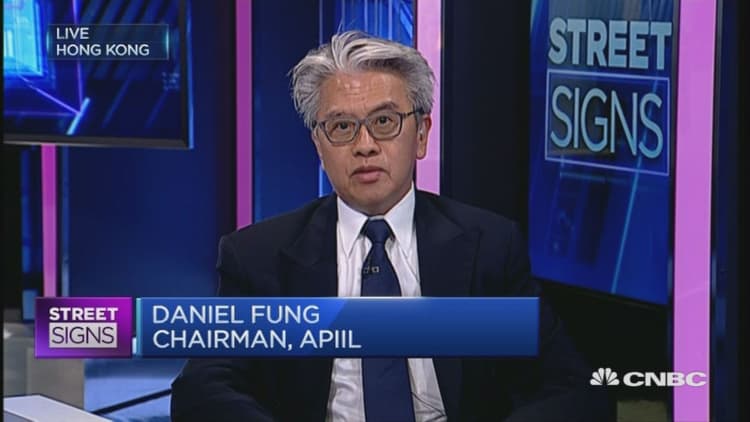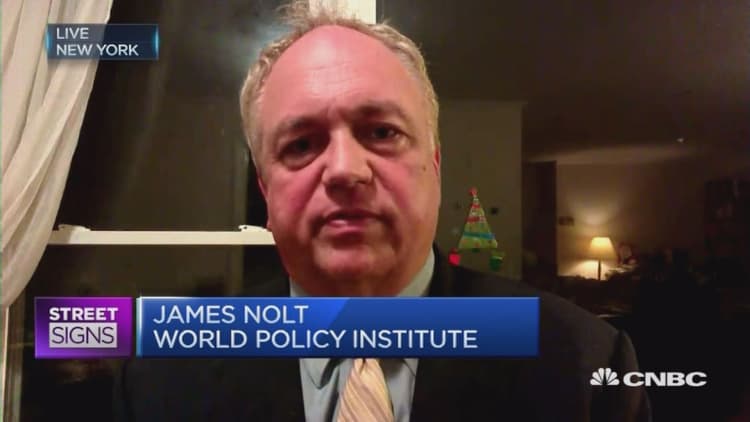


If you'd randomly turned on a TV in Manila early evening yesterday, you'd probably have caught a rather dour gentleman named Perfecto Yasay telling viewers "restraint and sobriety" were the most important requirements of the moment.
Without any other context, you might have thought he was delivering a eulogy. Maybe after some kind of upsetting murder, or after the country's notorious death squads ran amok.
But Yasay is the Philippine Foreign Secretary, and he was delivering his country's first official response to a ruling on his country's challenge of China's claim to pretty much all of the South China Sea.
The ruling from a tribunal of the International Court of Arbitration in The Hague, was the end result of a bold test case, on which the judges found overwhelmingly in favor of the Philippines. Three years in the waiting, and filed by the only Southeast Asian claimant to the South China Sea with the guts to do so.
So, you might have expected a victory parade through downtown Manila. Maybe even Carnival, Philippine-style.
But in the event, as often happens with small states, it seems the Philippines is content with a careful, modest acknowledgment of victory, rather than bombastic public chest-beating.
And the Philippines is probably wise to be so.
Privately, the reaction is very different. In the Twittersphere, for example, Filipinos were feeling pretty nationalistic. The hashtag #chexit, short for "China exit," is the new appellation du jour.
Meanwhile back at Malačanang, other than Yasay's grave, measured tones...conspicuous silence.
As of this writing, President Rodrigo Duterte hadn't actually even commented on The Hague's landmark ruling. Odd, you might think, for someone who's rarely short of things to say, and who proffers opinions many people would prefer he kept to himself.
But Duterte, I believe, is being careful rather than coy.
Remember, this is actually not his fight. Benigno Aquino, Duterte's immediate predecessor, was the one who brought the case three years ago. He took the issue to the world's highest court after direct negotiations with China hit what he felt were a dead end. The case was well into play when Duterte was still comfortably ensconced in his Davao fiefdom down in Mindinao, and coming close to its end when "The Punisher" was only just beginning to register in the national consciousness.
In other words, this case may not have made it to The Hague under Duterte. And the result may not be what Duterte would have wanted.
Though he is formally legally trained, Duterte is a man who more easily understands the law of the street. Natural law. So he knows when you've roundly thrashed a much more powerful opponent who's used to throwing his weight around successfully, you don't stand over him and perform the haka. And he knows while China may be on the back foot right now, it's certainly neither down nor out.
The risk is, China could easily get back up angrier than ever, and won't have to look too far for payback. And the Philippines won't have anywhere to hide.
In any case, you could argue that while The Hague's ruling gives some people comfort and a sense of justice, others might feel it's totally the wrong approach. Former U.S. Defense Secretary Chuck Hagel told CNBC the ruling gives the Philippines and other Southeast-Asian countries aggrieved by China's assertiveness the moral high ground. The ruling is final, and legally binding.
True. But the problem is, it's also not enforceable. We won't see blue-helmeted U.N. peace-keepers swarming around any atolls in the South China Sea anytime soon. It's not that kind of situation. Instead, this global and very public censure of China is a name-and-shame approach.
But modern historical precedents show China does not react positively or constructively to that kind of handling. It backs them even more into a tight corner.
Instead, there are already a number of reasoned voices urging Duterte to take advantage of the opportunity to talk to China, out of the public glare, on a more even footing, backed by The Hague's decision.
Government officials, including Yasay himself, have gone further - he's been quoted asking why there should be anything to fear from China - which seems to point to a reset of relations, and direct negotiations with Beijing.
There will be talks about fish, about why China should stop ramming hapless Filipino trawlers and fire-hosing fishermen. This has happened more often than it really should, in what The Hague yesterday ruled were Philippine sovereign waters. This matters because fisheries account for about 1 percent of Philippine GDP. Not a whole lot, but more than a little.
There will be talks about joint exploration of resources. We're talking about oil, under the seabed. The reserves may belong to the Philippines, but Chinese involvement, including investment, would help extract oil and gas more economically and efficiently than if the Philippines were to do it on its own. It can still be an open bidding process, but China would be an obvious front-runner.
Much of the debate over control of the South China Sea is framed in neo-Cold War terms. How to "contain" a resurgent and assertive China.
Duterte is much more and intimately familiar with guerilla wars and drug wars. He will likely approach China not as an adversary, but more as a patron or sponsor, but to support the Philippines' own agenda.
One of his biggest challenges will be keeping the U.S. on-side at the same time. Washington is used to having the upper hand in relations with the Philippines. But it has serious competition now.


